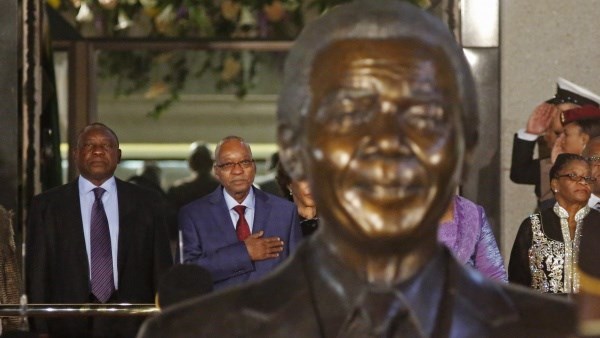
Friday October 5, 2018
by John Campbell
Jacob Zuma, president of South Africa at the time, stands with then-vice president and current President Cyril Ramaphosa behind a statue of former South African President Nelson Mandela outside Parliament in Cape Town on June 17, 2014. Schalk van Zuydam/Reuters
The New York Times has published a long article on internecine murder within South Africa’s ruling African National Congress (ANC). The victims are mostly local politicians, typically rivals of those entrenched in the party’s machinery and its corruption, and killings take place mostly in rural KwaZu-Natal. During the nine years that Jacob Zuma led the party and was chief of state, portions of the ANC increasingly came to resemble a criminal conspiracy. In some ways, the current round of killings resembles a feud among Mafiosi. Crispian Olver, once an ANC operative, in How to Steal a City: The Battle for Nelson Mandela Bay, profiled ANC political corruption in Port Elizabeth, located in the Eastern Cape.
KwaZulu-Natal is Zuma’s political base, and he remains active there. He reportedly has been seeking to sabotage his successor, President Cyril Ramaphosa. His fellow Zulus are about a quarter of South Africa’s population and a large majority of the population of KwaZulu-Natal. Zuma is especially strong in the rural areas, where he has allied himself with the Zulu king, Goodwill Zwelithini. Zuma is increasingly the voice of traditional, nativist rural dwellers opposed to the de-tribalized, urban, and modern elements of the ANC led by Ramaphosa.
Despite the image of Nelson Mandela, internecine violence was also characteristic of the ANC during the struggle against apartheid. It was especially notable in ANC fighter camps outside of South Africa, where “apartheid spies” were murdered with no due-process and with the suspicion of trumped-up charges by political rivals. Jacob Zuma, chief of ANC intelligence in Zambia, has been linked to such murders, but he has never been tried or convicted.
Violence between members of the ANC in rural KwaZulu-Natal occurs far away from modern, sophisticated Johannesburg, Cape Town, and even nearby Durban. The internal politics within the ANC is therefore understandably very different in these urban areas from what goes on in rural areas. In so many ways, South Africa is a developed country with a modern infrastructure, the rule of law, and strong protection of human rights on the one hand, and a developing country on the other. For example, the constitution has sweeping guarantees of the equality of women, while King Goodwill tries to enforce patriarchy within his dominions. To an extent, Ramaphosa is caught in the middle as he prepares for elections in early 2019. To preserve its parliamentary majority, the ANC is dependent on its rural base—and on KwaZulu-Natal. Hence, his critics credibly claim, his reluctance to clamp down on the ANC there.